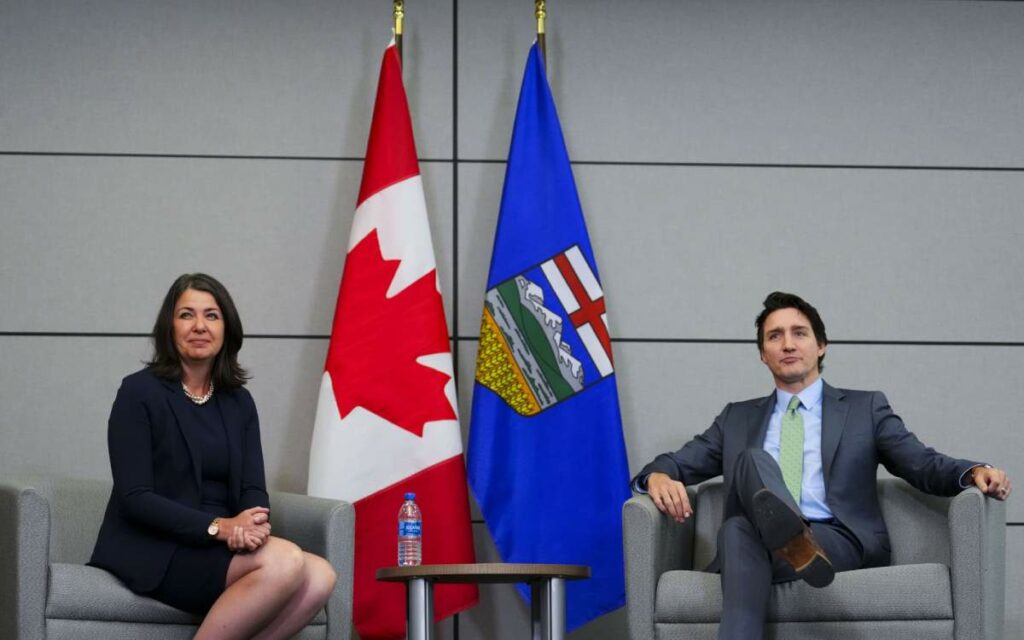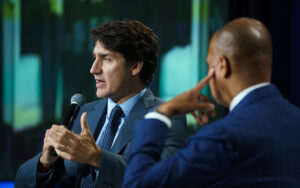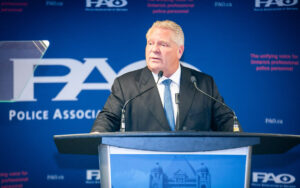
Last week, the Liberal government very quietly indicated its intention to extend the current equalization formula until 2029. The formula, which sees billions of dollars transferred from wealthier provinces to “have nots” each year, largely benefits Quebec and the Atlantic provinces at the expense of Alberta. Pictured is Alberta Premier Danielle Smith alongside Prime Minister Justin Trudeau. Photo credit: The Canadian Press/Sean Kilpatrick
A major policy development that seems to have been largely ignored in recent weeks involves the federal Liberal government’s plan to extend the current federal-provincial equalization payment formula until 2029, with apparently little if any consultation with the affected provinces.
Equalization is a federal program that ensures significant monetary transfers are made from wealthier provinces to less wealthy ones via a complex formula that is supposed to enable Canadians in all parts of the country to access comparable government services. Over the years, this has typically meant that Alberta taxpayers have subsidized Quebec and the Atlantic provinces – and occasionally Ontario, Manitoba, and BC – to the tune of billions of dollars.
Last week, the Liberal government very quietly indicated its intention to extend the current equalization formula until 2029 as part of an omnibus budget motion. The low-key way in which this was done seems to imply the Liberals hoped that no one would notice. This is part of a pattern with this government which, in the context of a voluminous budget implementation bill in 2018, extended the existing equalization formula until 2024.
Both Alberta and Saskatchewan were caught off-guard by this decision, as they had not been consulted by then-Finance Minister Bill Morneau. When first elected as Prime Minister, Justin Trudeau claimed he would have a much more consultative relationship with the provinces than the previous Harper government. At this time, we can safely say that was yet another promise broken by Trudeau.
Alberta’s United Conservative Party government recently released a position paper calling for several reforms to the equalization formula, claiming that the current program unfairly hurts wealthy provinces and disincentivizes growth in so-called “have not” provinces. There is considerable evidence that this is true, as provinces on the receiving end of equalization decline to develop parts of their economy as it would be likely to reduce their share of equalization funds. The fact that the same provinces tend to be on the receiving end of equalization over decades would also support this assumption.
Quebec has historically been by far the largest recipient of equalization payments and is on track to receive a whopping $14 billion this year – almost 60 per cent of total national equalization payments for a province that has about 22 per cent of Canada’s population. That mismatch alone would suggest there is a more political than economic aspect to the equalization regime.
It has become a very bad habit of governments in recent years – notably Liberal governments – to implement measures that tie the hands of future governments for some time into the future. This was the case with Ontario’s McGuinty/Wynne governments who put in place absurdly expensive contracts with providers of wind and solar power as part of the Green Energy Act of 2009. Some of these contracts were as long as 40 years and are still in force today, keeping electricity prices in Ontario much higher than they should be and hurting the province’s competitiveness.
As senior advisors from the McGuinty days moved to Ottawa when Justin Trudeau was first elected as Prime Minister in 2015, it is not surprising that this practice has continued with the current federal Liberal government. Some current Trudeau Cabinet Ministers have commented that they want to structure policies such that they can’t be changed when a new government takes over. This most recent move to extend the current equalization payment formula is another example of this.
Unfortunately, attempting to ensure policies endure long past a government’s tenure undermines democracy, since if Canadians decide they don’t like the policies of a particular government and vote them out, they could still be stuck with that government’s policies well into the future. It’s bad enough that the current federal government’s overspending and resulting debt will carry forward for many years to come, but enshrining other policies so they are very difficult for future governments to reverse is inexcusable.
Whether they mean to or not, one thing the Liberals are doing with equalization policy, as well as several so-called climate policies, carbon taxes and the like is giving a big boost to the campaign of United Conservative Party leader Danielle Smith in the upcoming May 29 Alberta election.
The Trudeau government seems bound and determined to punish Alberta and Saskatchewan whenever possible, and to do so in the sneakiest possible way as they are with equalization policy. This will merely serve to elect governments in those provinces opposed to the federal agenda, and further erode national unity at a time when it is already on shaky ground.

She has published numerous articles in journals, magazines & other media on issues such as free trade, finance, entrepreneurship & women business owners. Ms. Swift is a past President of the Empire Club of Canada, a former Director of the CD Howe Institute, the Canadian Youth Business Foundation, SOS Children’s Villages, past President of the International Small Business Congress and current Director of the Fraser Institute. She was cited in 2003 & 2012 as one of the most powerful women in Canada by the Women’s Executive Network & is a recipient of the Queen’s Silver & Gold Jubilee medals.




















